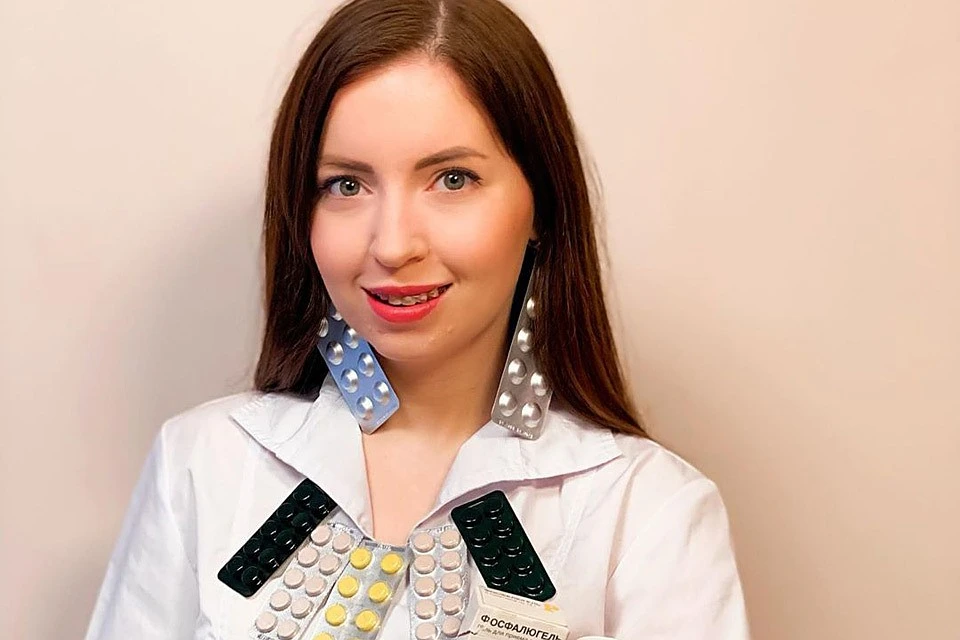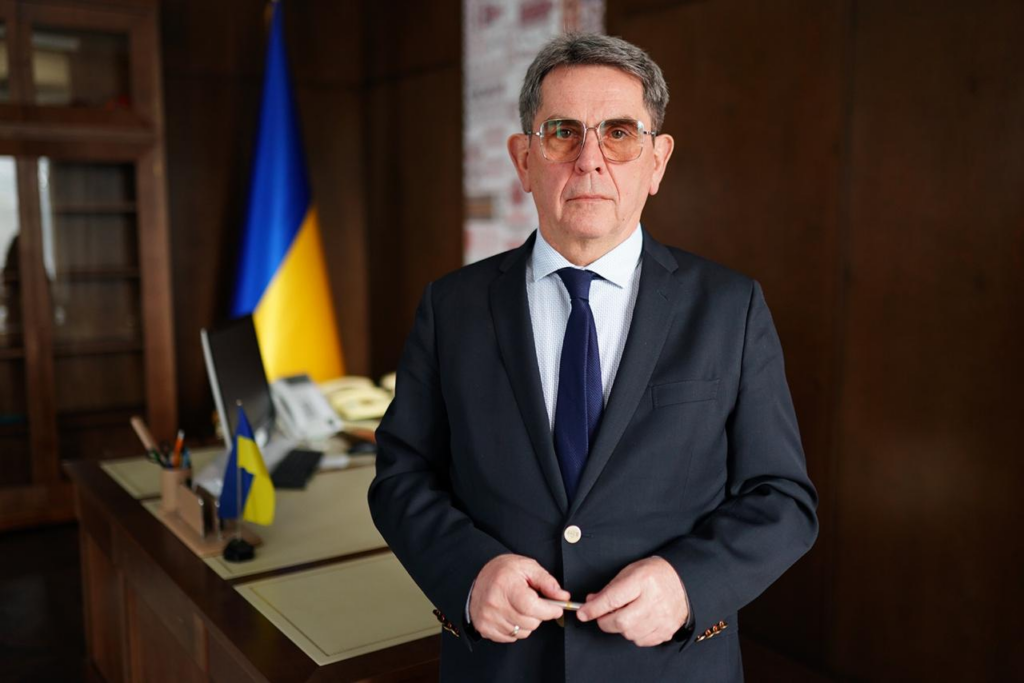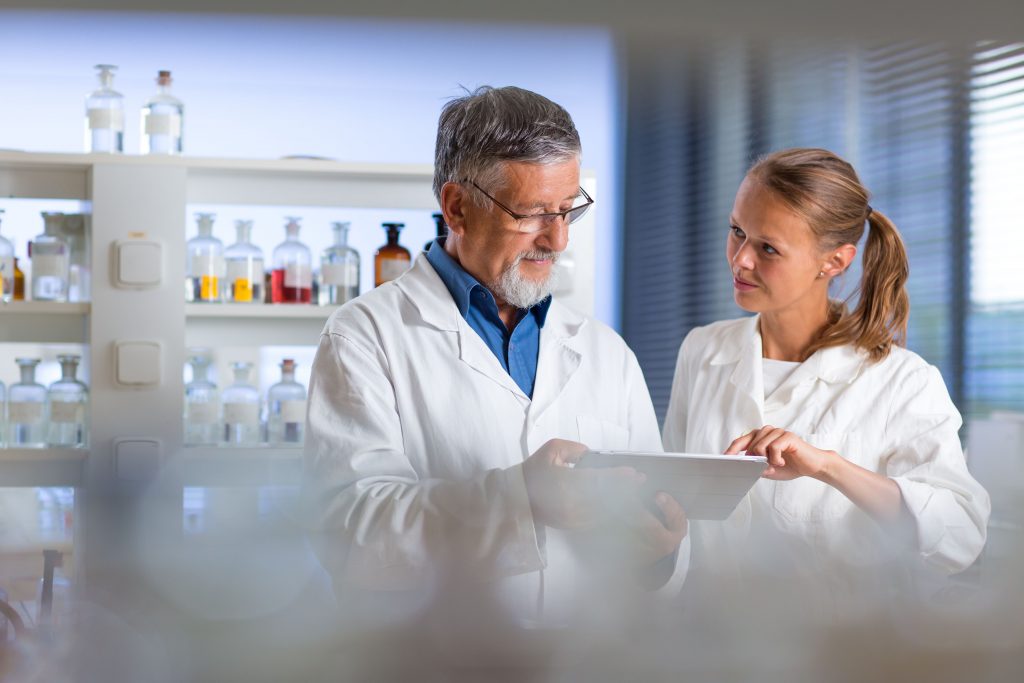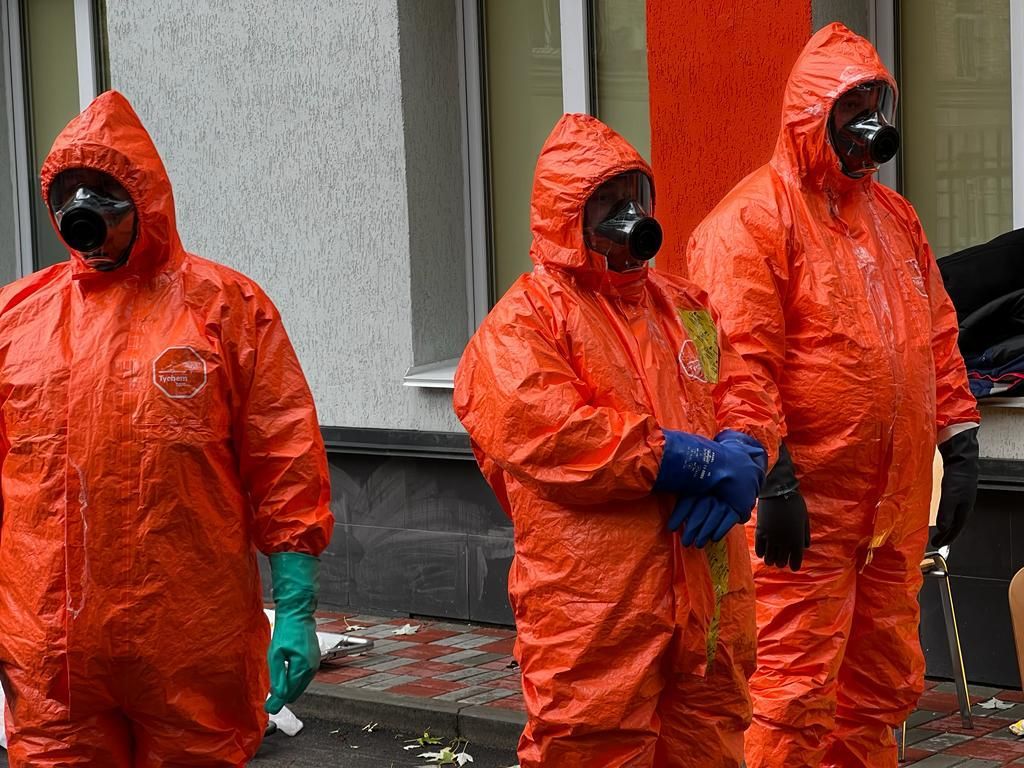
– I know that this is not your first visit to Ukraine since February 2022. Last time, in March, you visited Lviv, where you taught doctors how to help victims of chemical attacks. What are your plans for Kyiv?
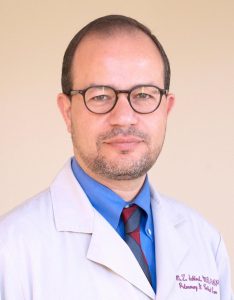
– If we talk about the purpose of this mission, I came to Kyiv to conduct trainings for medical workers. Healthcare facilities must be ready to receive patients in the event of a chemical weapons attack. My first visit to Ukraine was in early March in Lviv. We were invited by the Ministry of Health. At that time, there were high risks that Russia would use chemical weapons. And I am from Syria, and I unfortunately have such experience.
Syria has become one of the countries where chemical weapons have been used most often. The Assad government, with which russia actively cooperated, led the chemical attacks.
If we go back to the trainings, we teach medical workers to identify chemical warfare agents that have been used, we give them an algorithm for helping the injured, we teach them how to use antidotes, and how to keep proper medical records. In other words, we give recommendations on how to respond to chemical attacks.
Chemical weapons are banned in the world. The memorandum against the use of chemical weapons has been signed by most countries, including russia, but this has not stopped anyone in Syria.
To me, russia is an enemy country that destroyed our cities, killed our civilians, bombed our hospitals.
We had about 200 hospitals destroyed. 60,000 thousand people were affected, among them children. I see that in Ukraine the war is following the same scenario.
– Please tell us more about the trainings you brought back.
– All the trainings we have brought to Ukraine are in coordination with the Ministry of Health. We have already conducted training for 943 doctors and nurses from 61 medical centers.
Part of the training is devoted to the situation of mass admissions of chemical weapons victims to the hospital. We realize that in peacetime every hospital has the resources to help patients, but in war, things are very different and a very different response model is needed. Imagine a hospital receiving several hundred patients with chemical weapons casualties at the same time. Can you imagine that?
– Introduced…
We teach the staff how to act in such a situation. We teach medical triage, assistance to patients with polytraumas, etc. Usually doctors in civilian life do not encounter this, so we invite surgeons from the USA who have already gained the necessary experience, and they conduct training in different cities of Ukraine.
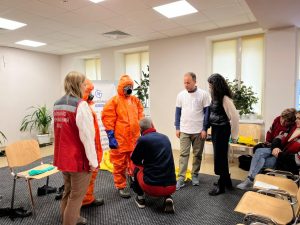
Another of our courses focuses on the use of portable ultrasound. This is a fairly new technology that allows ultrasound to be connected to tablets or phones. We remember that in peacetime, hospitals have CT scans, MRIs, and other diagnostic capabilities. But in times of war, our options are greatly reduced, especially in the field. Our organization has already donated a significant number (25) of portable ultrasound devices to the front lines so that doctors can help the wounded there and save lives.
We also donated a significant number of headlamps for doctors to use when there is not enough light or no power at all. We also donated surgical kits and much more. In total, MedGlobal provided assistance to Ukraine in the amount of 4.5 million dollars.
– What should health care providers do in a chemical attack?
– The first thing we need to do is to be prepared for a chemical attack. We know that chemical weapons are weapons of mass destruction. In Syria, 345 chemical weapons attacks have been recorded by human rights organizations.
We emphasize that it is very important that medical personnel have sufficient personal protective equipment: suits, masks, goggles. When there is a mass influx of casualties, the first thing hospital workers need to do is to protect themselves. If a doctor or nurse comes in contact with a victim without protection, they will get the same symptoms of poisoning as the patients.
We’ve had situations in Syria where doctors and nurses who didn’t have protection from chemicals just died because of it.
Medical professionals need to understand what poisonous substances were used during the attack. Depending on the class of poisonous substances, appropriate treatment is selected.
This information is not available to the general public, but we already know that mustard gas causes respiratory symptoms, skin manifestations, eye irritation, etc. If they are nerve agents, there will be shortness of breath, excessive salivation, seizures, paralysis, etc. For example, the same “Novichok”, is one example of warfare poisonous substances. It is the substance that was used by the Russian government in order to fight opposition movements in Russia. It was Novichok that was used in the poisoning of Alexei Navalny.
– What should the doctor do?
– If it is a nerve agent, antidotes must be available. The main antidote today is “atropine” and “pralidoxime”. It is necessary to have a sufficient amount of personal protective equipment, to know how to properly decontaminate. That is, when we have a mass influx of patients, we need to organize a special room in front of the department or in front of the entrance to the hospital, where decontamination will take place.
Basic principles: remove the victim’s clothing and rinse well. This can be just water or a solution such as sodium chloride. After that, patients can be transferred to a “cold” area. Because the area where there is contact with such substances is called “hot”. It is very important that doctors in the “cold” zone work with patients who do not have poisonous substances on them, because it is physically very difficult to work in chemical protection suits.
Chemical weapons have killed 2,000 people in Syria. The Assad government used it to sow panic among civilians, to control territory that was difficult to capture.
By using chemical weapons, people were forced to leave their cities.
A friend of mine who worked as an anesthesiologist in a small hospital near Damascus told me how in August 2013, his hospital started receiving patients en masse. The hospital admitted 700 people affected by sarin gas. He was forced to make decisions, about medical triage, deciding who would live and who would not. That night, 144 people died in the hospital, two-thirds of them children. This tragedy stayed with him for the rest of his life.
– Do you see similarities between the war in Syria and the war in Ukraine?
– I can draw many parallels between the war in Ukraine and the war in Syria. For me, the war in Syria was a prelude to the war in Ukraine. I have information on how Russia prepared for the war in Syria. They tested over 310 weapons. They threw 70,000 military personnel into Syria. About 60,000 civilians died. But no one has been held accountable for that. And I believe that this is one of the main reasons why the war in Ukraine has now started.
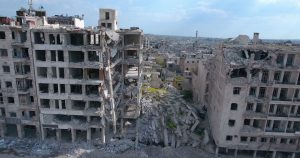
The world has not been paying attention to the war in Syria. And I have the right to criticize the actions of our government because they are also responsible for allowing russia to join the criminal actions of the Assad regime in 2015. That gave the green light to russia because it was with impunity. In 2014 the events in Ukraine started to unfold, then there was the annexation of Crimea and Putin felt very confident because there was no accountability, there was no reaction from the world.
We know that, according to WHO statistics, 260 health-care facilities in Ukraine have already suffered from the actions of the Russian army. If we are talking about the Assad regime, 580 hospitals have suffered from the actions of the Russians. Terror is a common strategy of the Russians. They sow panic, make people flee. Such territories are easy to control and hold.
I see many parallels in Mariupol and Aleppo – the same ruins, casualties, blood and pain.
If we talk about the continuation of the war in Ukraine, the actions of the Russian army will become even more brutal, even more brutal, and more civilians and infrastructure will suffer, because sanctions are unlikely to be enough to stop Russia.
I am not a politician, but in my opinion, the steps of the EU countries and the US are not enough. At one time, I was involved in preparing a special report for the UN Security Council on how Aleppo was living under siege. We are now preparing a similar report on the situation in Mariupol.
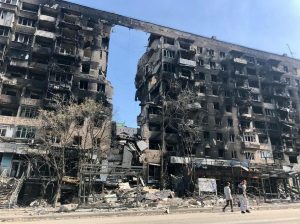
There were about 2 million people under siege in Syria. We know how difficult it is for people to survive in such conditions. In 2015, when the last stage of the siege was already underway, I traveled to Aleppo with two doctors from the United States.
There was only one road there, and bombs were constantly being dropped on that road. We worked in the hospital, which was actually underground, in the basement, because it was impossible to do otherwise.
The consequences of the siege were serious: first of all, children suffered from malnutrition, pregnant women suffered because it was impossible to provide even minimal assistance during childbirth. There were not enough doctors, nurses. Health problems that are easily solved in ordinary life, such as blood clots, heart attacks or banal infections, led to death, because when there are no antibiotics, there is nothing you can do to help.
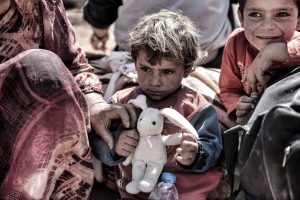
The most painful memory was the faces of the children from Aleppo. Exhausted, frustrated, tired, hungry. They were sick, malnourished, they had nightmares, they screamed in their sleep. Many had lost their parents.
Russia, for me, as a Syrian, has become an enemy country, a murderer country, an executioner country.
During our first mission to Ukraine, we helped a family from the Kiev region leave for Poland. This family lived not far from Kiev, and when the Russian troops came very close, they decided to evacuate. There were inscriptions on the car that they were civilians, that there were children in the car. But they still got hurt. Their grandmother was shot and died from blood loss. The mother was shot in the arms and moaned in pain as the anesthetic wore off. The boy in that family was named Timothy. He struck me because he was very intelligent and knew many languages. His face and eyes reminded me of the eyes of children in Aleppo.
War makes everyone suffer. It was so in Syria, it is so now in Ukraine. And it’s the civilians who suffer the most. That’s why we come here. We want to help, we want to save people’s lives. Because children in Syria, in Ukraine, or in any other country in the world should play, dream and know that they will have a normal life.
– What difficulties will the Ukrainian healthcare system face because of the war in the future? After all, they will.
– I also wrote an article at one time about how war is the main enemy of the health care system. When a country is at war, resources are spent on people injured or traumatized by the fighting. And because many resources are spent on dealing with the effects of war, those resources may not be available for people with other illnesses.
I would like to pay special attention to people with chronic diseases. The situation with vaccination is changing significantly; we realize that it is impossible to keep to the vaccination schedule under such conditions. Various infections that we have long forgotten about are beginning to flare up. And they begin to appear gradually. For example, measles has returned to Syria, polio, which had not been present for 13 years, and tuberculosis has returned. There is now an outbreak of cholera in Syria, which has also been absent for many years. HIV and coronavirus will also become relevant. All of this your Ministry of Health must take into account in its plans to direct resources not only to those who are traumatized directly because of the war events, but also to help people with chronic diseases and thus reduce this negative impact of the war.
– Please tell us about MedGlobal. Why is it important?
– MedGlobal was established in 2017. Our main task is to work in emergency situations, during humanitarian crises. We are actively working in different countries around the world. At first it was a group of doctors and nurses from the United States who decided to create this organization. Since I had experience working in Syria, I also joined the initiative. Today, I am the only Syrian on the board of directors.
It is very important to us that we improve access to health services and that they are services that are delivered to people in the right way, with dignity and respect, so that there is equity in access to health services.
We have so many medical programs. We have worked in 18 countries. Now we are working in 8 countries around the world.
We put a lot of effort into training professionals and training them in mental health. We help hospitals, we work in the community. Our priority is to help internally displaced people who have been forced to leave their homes.
A program for refugees from Venezuela began in 2017. Last year, our services reached more than 9 million people around the world. In terms of our most recent activities, the focus has been on the pandemic and its aftermath.
But we are guided in our activities by the principle of priority, that is why we are now working in Ukraine.

